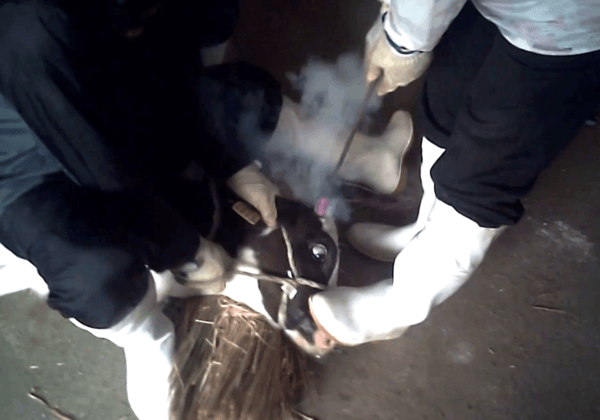Appalling Animal Attractions: Tiger Temple in Thailand
BREAKING: 137 tigers are currently being rescued by Thailand’s Department of National Parks and will be transferred to animal refuges within the country. Tiger Temple is currently closed.
Tiger Temple in Kanchanaburi, Thailand, calls itself an animal “sanctuary,” but in reality, tigers here are imprisoned and denied everything that is natural and important to them.
- A three-year investigation into the treatment of tigers at the facility, conducted by Care for the Wild International, found that they are confined in pairs to barren, cement cells for up to 20 hours a day. Their living quarters offer no enrichment.
- Living in such an environment denies tigers opportunities to roam and exercise, which are vital to their well-being.
- When they are allowed out, it is simply to make money for the temple—for hours every day, a constant stream of tourists pays to pose for photos next to the chained tigers in the scorching sun. During these sessions, the animals are heavily sedated, their movements are restricted, and they are given no shade.
- A reputable sanctuary will not force animals to perform for visitors, yet tigers and cubs—the largest tourist draw at the temple—are used as photo props to attract several thousand paying customers each year.
- Reputable sanctuaries also never encourage visitors to have direct contact with wild animals, yet the monks at Tiger Temple encourage tourists to stroke and pet the tigers—or even sit or lie on them.
- Visitors have reported that the monks mock the tigers and beat them with sticks.
- Coming into close contact with these wild cats puts humans’ lives in great danger, and each year tigers have been reported to lash out at visitors.
 Cubs are prematurely separated from their mothers, which is psychologically traumatizing to both the infants and the mothers and deprives the babies of proper maternal care. Tigers are naturally solitary creatures, but in the wild, cubs stay with their mothers for about two years. At the temple, they’re allowed to stay with their mothers only for a couple of weeks.
Cubs are prematurely separated from their mothers, which is psychologically traumatizing to both the infants and the mothers and deprives the babies of proper maternal care. Tigers are naturally solitary creatures, but in the wild, cubs stay with their mothers for about two years. At the temple, they’re allowed to stay with their mothers only for a couple of weeks.- According to a former volunteer at the temple, many of the tigers simply “disappear” when they inevitably become impossible to handle. Care for the Wild found that the facility exchanged older tigers for young cubs in Laos, as cubs bring in the most money for the temple. Rather than fostering respect for highly endangered tigers, the monks blatantly exploit them for money.
What you can do
Please pledge never to patronize Tiger Temple or any other animal attraction. Financially supporting animal acts like this ensures continued cruelty to animals.
If you know anyone planning to visit Thailand, please ask them not to add this cruel tourist trap to their itinerary and to go on another adventure instead.
You can also warn other travelers not to visit Tiger Temple on attraction-review sites such as TripAdvisor.com.








